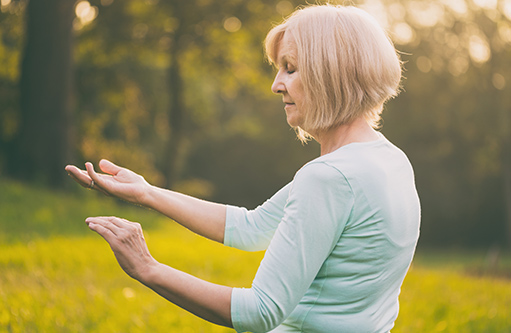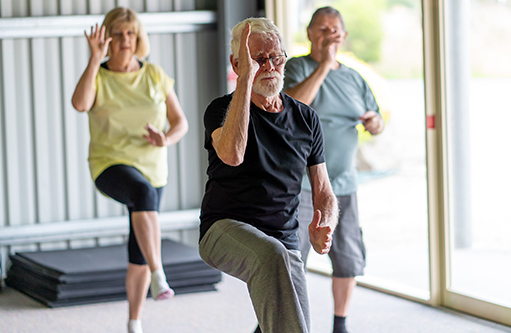
Cognitive impairment is one of the most common problems affecting older adults. Physical activity and mental training practices may prevent age-related cognitive impairment. Accumulating evidence has shown physical activity can improve cognition in adults with mild impairments of memory and executive tasks. Tai Chi has also been shown to improve processing speed for people with dementia.
What is Tai Chi?
Tai chi is an ancient Chinese movement practice that offers several benefits for seniors. For the elderly especially, it can help maintain stability, enhance muscle control, and improve cognitive function. Tai Chi combines coordination of slow movements with mental focus, deep breathing, and relaxation. This gentle martial art puts emphasis on patience, which makes it accessible for people with dementia.
Japan is known to have the lowest prevalence of dementia among developed countries, likely due to its use of Tai Chi and other forms of slow movement activities. Tai Chi has been found to slow the progression of mild cognitive impairment, and this decrease in symptoms is comparable to other forms of exercise or rehabilitation methods.
Tai Chi focuses primarily on the movement its guiding principles are based off of. The form emphasizes mindfulness and concentration to greatly improve both brain function and personal well-being. These movements are a specific sequence with set choreographed pattern trajectories in which the user must learn each movement and remember its order. This leads to sustained attentional focus and challenges for one’s mental multitasking abilities.
 Tai chi is an ancient Chinese movement practice that offers several benefits for seniors. For the elderly especially, it can help maintain stability, enhance muscle control, and improve cognitive function.
Tai chi is an ancient Chinese movement practice that offers several benefits for seniors. For the elderly especially, it can help maintain stability, enhance muscle control, and improve cognitive function.
What are the Benefits of Tai Chi?
Tai Chi has many positive effects on the body, including better balance and flexibility, reduced pain, and an ability to help older people better their physical capabilities. Tai Chi has also been proven to have a positive impact on brain health. One specific aspect of Tai Chi often overlooked is its effect on dementia. Tai Chi can improve memory in individuals with mild cognitive impairment as well as reduce agitation among those with Alzheimer’s disease. Most importantly, Tai Chi can improve a person’s brain wellness and help slow down aging-related cognitive decline.
The physical and mental benefits of Tai Chi are numerous and well-documented. These gentle movements are easy on the joints and provide many proven benefits such as improving balance, reducing the risk of falls, lowering blood pressure, improving sleep quality and lowering stress. We at Avanti Senior Living are dedicated to the overall health of our residents and have included these types of movements into our Mind•Body•Strength Program.
Because of its overall impact on the body and mind, Tai Chi has a number of benefits, including the following:
- Improves mood
- Improves balance, stability, flexibility, and agility
- Increases muscle strength and energy
- Enhances cognitive function (including memory)
- Decreases stress, depression, and anxiety
What are Tai Chi’s Effects on the Brain?
One of the many brain benefits you can experience with Tai Chi relates to how this ancient martial art typically involves crossing over the midline in our body. Many of Tai Chi’s movements require one to cross the midline of the body, which benefits people with dementia because it requires the two hemispheres of the brain to communicate and coordinate. More than half of all movements are designed specifically for rotation or crossover. Crossing the midline unifies cognitive and motor regions of the brain, meaning that improved performance in a variety of areas such as memory retrieval and coordination is observed.
Final Thoughts

Tai Chi is becoming increasingly popular as a coping strategy for people with dementia. Tai Chi, considered one of the oldest of Chinese exercise routines in existence and a universal practice from all walks of life, has begun to be used more often as an intervention or technique for people with dementia. What’s even better? Tai Chi can help reach functional goals.
Tai Chi is both progressively and mindfully learned as one’s understanding progresses. In addition, Tai Chi has many benefits that have been proven by a number of studies. These include the ability to exercise uninterrupted over an entire lifetime, which research shows will help improve or in some cases reverse the inevitable decline of brain health with aging.
Avanti Senior Living is here to help your loved one live longer and healthier. Making a move into our community will provide them with the care they need in order to stay healthy, happy, and independent. Contact us today for more information or to schedule a tour.

 Tai chi is an ancient Chinese movement practice that offers several benefits for seniors. For the elderly especially, it can help maintain stability, enhance muscle control, and improve cognitive function.
Tai chi is an ancient Chinese movement practice that offers several benefits for seniors. For the elderly especially, it can help maintain stability, enhance muscle control, and improve cognitive function.